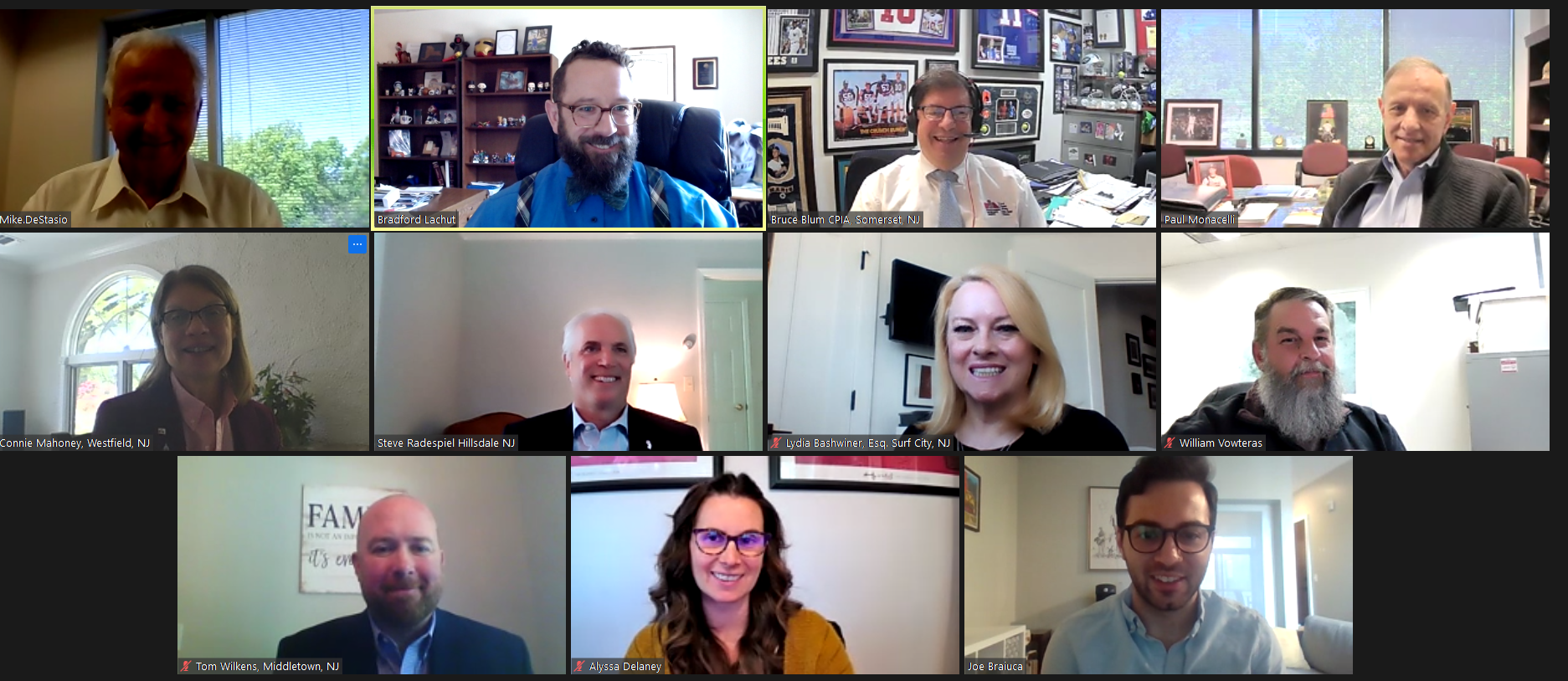As part of PIA’s Virtual Advocacy Day last week, PIANJ and NJYIP leaders met with staff from the offices of New Jersey’s congressional delegation.
PIANJ and NJYIP leadership included the following:
- PIANJ President Steve Radespiel,
- PIANJ President-elect Mike DeStasio Jr., TRIP
- PIANJ Vice President Connie Mahoney
- PIANJ Vice President Thomas Wilkens
- PIANJ Immediate Past President Bruce Blum, CPIA
- PIANJ past President and PIA National Director Paul Monacelli, CIC, CPIA
- PIANJ past President Lloyd ‘Rip’ Bush Jr., CPIA
- PIANJ past President William R. Vowteras
- PIANJ Director Lydia Bashwiner, Esq., CWCP, NJWCP
- PIANJ Director William McMahon, and
- NJYIP President Alyssa Delaney.
NFIP
PIANJ leadership advocated for the long-term reauthorization of the National Flood Insurance Program. Since the last long-term reauthorization expired in 2017, the program has been extended an astounding 16 times. No extension has been longer than one year. These repeated short-term reauthorizations are detrimental to the program—without long-term stability, many of the reforms that are desperately needed cannot be addressed.
The gradual implementation of risk-based rates, continued grandfathering of rates when a property is sold, increased funding for mitigation efforts—including increased cost of compliant —all are necessary reforms that need to be addressed in a long-term reauthorization.
Additionally, PIANJ stressed the importance of leaving the current Write-Your-Own compensation structure in place. Currently, WYO companies are entitled to 29.9% of premium dollars. That money goes to reimburse WYO companies for the cost of selling the policies and servicing the claims. Most importantly, producer commissions are included in that 29.9%. Any reduction in the compensation number would lead to a reduction in producer commissions, which could have devasting effects on the NFIP.
Insurance producers are critical to the sale of NFIP policies, keeping consumers informed about the constant changes with the programs, and being on the frontlines when a claim occurs. Any cut to producer compensation will lead to an exodus of producers from the program, which, ultimately, will harm the consumer.
Cannabis
With the Garden State being one of the latest states to legalize the recreational use of cannabis, PIANJ explained to New Jersey legislators the importance of federal legislation that would protect insurance producers when they sell insurance to state-legal, cannabis-related businesses. While cannabis has been legalized either for recreational or medicinal use in nearly every state, it still is an illegal, Schedule 1 drug, federally. This puts many insurance producers in an untenable spot—if producers provide insurance to state-legal cannabis businesses, they run the risk of potentially being exposed to civil and criminal liability. To do their jobs effectively, independent insurance agents need protection from prosecution in the form of a comprehensive federal safe harbor for agents and brokers engaged in insurance business with cannabis-related enterprises in states where the substance is legal.
Tax reform
The U.S. tax law was amended in 2017 to provide much needed relief for agency owners of S corporations by making a deduction of up to 20% available to qualifying entities. The deduction allows individuals to exclude some of their income from federal income tax.
Passthrough businesses—organized as S corporations—are businesses in which income passes through to their owners’ income tax returns and is taxed as if it were individual income. Many owners of independent insurance agencies fall into this category. Unlike the C-corporation tax cuts—which also were included in the 2017 package—the passthrough deduction was not made permanent in the tax law. As a result, PIA members with qualifying passthroughs will lose their deduction at the end of December in 2025, unless Congress acts.
PIANJ leadership explained to federal New Jersey legislators that it is important to make the S corporation passthrough permanent because small-business owners will be able to plan for their financial future better.

Bradford J. Lachut, Esq.
Bradford J. Lachut, Esq., joined PIA as government affairs counsel for the Government & Industry Affairs Department in 2012 and then, after a four-month leave, he returned to the association in 2018 as director of government & industry affairs responsible for all legal, government relations and insurance industry liaison programs for the five state associations. Prior to PIA, Brad worked as an attorney for Steven J. Baum PC, in Amherst, and as an associate attorney for the law office of James Morris in Buffalo. He also spent time serving as senior manager of government affairs as the Buffalo Niagara Partnership, a chamber of commerce serving the Buffalo, N.Y., region, his hometown. He received his juris doctorate from Buffalo Law School and his Bachelor of Science degree in Government and Politics from Utica College, Utica, N.Y. Brad is an active Mason and Shriner.






